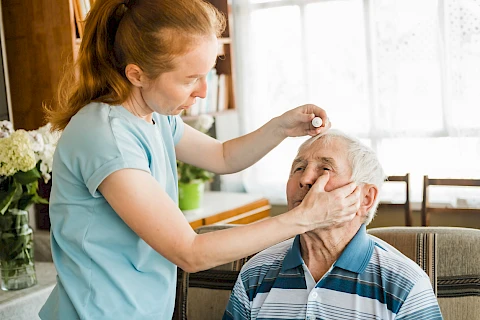
August is National Eye Exam Month, a perfect time to focus on the importance of eye health in seniors. As we age, our eyes require more attention and care. Itchy eyes are a common complaint among older adults, and understanding how to manage this issue can greatly improve their quality of life.
Common Causes of Itchy Eyes in Seniors
Several factors can lead to itchy eyes in seniors. Understanding these causes can help caregivers provide the right care.
Allergies
Allergies are a common culprit for itchy eyes in seniors. Seasonal allergies, such as pollen and other outdoor allergens, can cause watery, itchy eyes, especially in the spring and fall. Indoor allergens like dust mites, pet dander, and mold can also trigger reactions that result in itchy eyes.
Dry Eye Syndrome
Dry Eye Syndrome is another frequent cause of eye discomfort in older adults. As we age, tear production tends to decrease, leading to dry eyes. Environmental factors like wind, air conditioning, and smoke can exacerbate this problem.
Medication Side Effects
Medications can also contribute to eye irritation. Some common medications, including antihistamines, blood pressure medications, and antidepressants, can reduce tear production or affect eye health. It's important to pay attention to any new or worsening symptoms related to the eyes after starting a new medication.
Identifying Symptoms
Seniors and their caregivers recognize the symptoms of itchy eyes and manage them effectively. Common signs include redness, a burning sensation, watery eyes, and a gritty feeling. If symptoms persist despite home care, it's time to seek medical advice. Watch for signs of infection, like mucus discharge or extreme discomfort.
Minor irritation often improves with simple treatments, but serious conditions, like infections or diseases, require medical attention. Being able to differentiate between these situations is important for proper care.
Providing Relief
Once you've identified the cause of the itchy eyes, you can take steps to provide relief. Over-the-counter eye drops can be helpful. These include artificial tears, antihistamine drops, and lubricating gels. Always follow the instructions on the package and maintain hygiene while applying drops.
Warm and cold compresses can also offer relief. Warm compresses can help with oil gland function, while cold compresses can reduce inflammation and discomfort. To use a warm compress, soak a clean cloth in warm water, wring it out, and place it over closed eyes for 5-10 minutes. For a cold compress, use the same method with cold water or an ice pack wrapped in a cloth and apply for 5-10 minutes.
Lifestyle adjustments can make a significant difference. Using humidifiers and air purifiers can help maintain moisture in the air and reduce allergens. Staying hydrated and including omega-3 fatty acids in the diet can also support eye health.
When to Seek Medical Attention
Make sure you know when itchy eyes are more than just a minor nuisance! If symptoms last for more than a few days or worsen over time, consult a healthcare provider. Look out for excessive redness, severe pain, vision changes, or thick discharge, as these could be signs of infection or serious conditions.
Regular eye exams are crucial for maintaining eye health. Routine check-ups can catch issues early before they become severe.
Provide More Support for Senior Loved Ones
Managing itchy eyes in seniors involves identifying the cause, providing appropriate relief, and knowing when to seek medical advice. Regular eye examinations, especially during National Eye Exam Month, are crucial for maintaining eye health.
If you need personalized senior care services in Atlanta, Marietta, Alpharetta, or Roswell, contact us at Senior Helpers North Metro Atlanta. Our in-home caregivers can help many seniors maintain a higher quality of life.